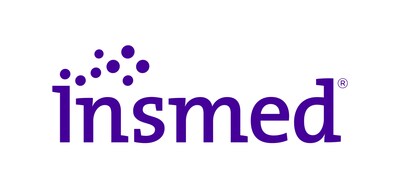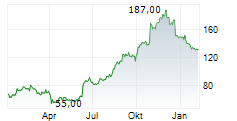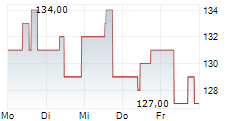-Non-Cystic Fibrosis Bronchiectasis (NCFB) Is a Serious, Progressive Lung Disease That Can Lead to Permanent Lung Damagei -
-BRINSUPRI Is a First-in-Disease, First-in-Class DPP1 Inhibitor Targeting Neutrophilic Inflammation -
-BRINSUPRI Was Reviewed Under EMA's Accelerated Assessment Pathway as It Is Considered of Major Interest for Public Health -
BRIDGEWATER, N.J., Nov. 18, 2025 /PRNewswire/ -- Insmed Incorporated (Nasdaq: INSM), a people-first global biopharmaceutical company striving to deliver therapies to transform the lives of patients facing serious diseases, today announced that the European Commission has approved BRINSUPRI (brensocatib 25 mg tablets) for the treatment of non-cystic fibrosis bronchiectasis (NCFB) in patients 12 years of age and older with two or more exacerbations in the prior 12 months. The treatment is a first-in-class therapy, offering the first and only approved treatment to date for NCFB in the European Union (EU). It was reviewed under accelerated assessment by the EMA as it is deemed to be of major interest for public health.ii
NCFB is a chronic and progressive disease that can lead to permanent lung damage and lung function decline.i, iii Unlike other respiratory diseases that are characterised by airway narrowing, bronchiectasis causes airways to permanently widen, making it harder to clear mucus and bacteria, leading to persistent inflammation and infection.i, iii A hallmark of bronchiectasis is frequent exacerbations, or flares, when symptoms-such as coughing, increased mucus, shortness of breath and fatigue-worsen.iv, v, An estimated 600,000 people in the EU are diagnosed with NCFB, with approximately two million additional people potentially undiagnosed.vi, vii, viii, ix, x, xi
"Living with non-cystic fibrosis bronchiectasis profoundly alters daily life, taking a toll on both physical health and emotional well-being," said ASPEN lead study investigator James Chalmers, MBChB, Ph.D., Professor and Consultant Respiratory Physician at the School of Medicine, University of Dundee, UK. "The European Commission's approval represents a major milestone for patients and clinicians in Europe, offering a much-needed treatment that can help reduce exacerbations, potentially slow disease progression, and reshape the treatment landscape for this debilitating disease."
This approval is based on a comprehensive scientific evaluation of the marketing authorisation application, including data from the Phase 3 ASPEN and Phase 2 WILLOW studies, which were both published in the New England Journal of Medicine.xii, xiii In ASPEN, patients taking brensocatib 25 mg had a 19.4% reduction in annual rate of exacerbations, as compared to placebo.xii Brensocatib 25 mg also met several exacerbation-related secondary endpoints, including significantly prolonging the time to first exacerbation and significantly increasing the proportion of patients remaining exacerbation-free over the treatment period.xii Patients who received brensocatib 25 mg experienced statistically significant less decline in lung function, compared to placebo, as measured by forced expiratory volume in one second (FEV1) after using a bronchodilator, at week 52.xii The safety was also evaluated in both studies. The most frequently reported adverse reactions are headache (9.2%), hyperkeratosis (5.9%), dermatitis (4.2%), rash (4.1%), upper respiratory tract infections (3.9%), and dry skin (3.0%).xii, xiii
"At Insmed, our mission has always been to bring new therapies to underserved patient communities. With brensocatib, we now have the first treatment for non-cystic fibrosis bronchiectasis approved in the European Union-a historically overlooked population with long-standing unmet medical needs," said Martina Flammer, M.D., MBA, Chief Medical Officer of Insmed. "The accelerated approval reflects the strength of the data and the potential to become the new standard of care for treating patients with non-cystic fibrosis bronchiectasis who had at least two prior exacerbations. We are grateful to the patients, clinicians and partners who made this milestone possible."
The EC approval follows a positive opinion from the Committee for Medicinal Products for Human Use of the European Medicines Agency (EMA) on 16 October 2025. Insmed will engage with authorities across the EU to secure access for eligible patients beginning in early 2026.
Applications for brensocatib are currently under review with the Medicines and Healthcare products Regulatory Agency in the U.K. and the Pharmaceuticals and Medical Devices Agency in Japan.
You can read more about NCFB via the media materials page here. Note, this is for EU media only.
Media contact:
Angelika Maerz
Director, Corporate Communications - EMEA
+41 79 378 0247
angelika.maerz@insmed.com
Notes to Editor
About BRINSUPRI (brensocatib)
BRINSUPRI (brensocatib) is a small molecule, once-daily, oral, reversible inhibitor of dipeptidyl peptidase 1 (DPP1). In the European Union, BRINSUPRI (brensocatib 25 mg tablets) is approved for the treatment of NCFB in patients 12 years of age and older with two or more exacerbations in the prior 12 months.
Brensocatib is designed to inhibit the activation of enzymes (neutrophil serine proteases) in neutrophils that are key drivers of chronic airway inflammation in NCFB. Brensocatib is also being evaluated for its potential role in other neutrophil-mediated diseases.
For complete product information in the EU, please see the Summary of Product Characteristics (SmPC) that will soon be available on www.ema.europa.eu.
About ASPENxii
ASPEN was a global, randomized, double-blind, placebo-controlled Phase 3 study to assess the efficacy, safety, and tolerability of brensocatib in patients with non-cystic fibrosis bronchiectasis (NCFB). As part of the ASPEN study's conduct, more than 460 trial sites were engaged in nearly 40 countries. After excluding sites that did not enrol any patients and all sites in Ukraine, the total number of active sites in ASPEN was 391 sites in 35 countries. Adult patients (ages 18 to 85 years) were randomized 1:1:1 and adolescent patients (ages 12 to <18 years) were randomized 2:2:1 for treatment with brensocatib 10 mg, brensocatib 25 mg, or placebo once daily for 52 weeks, followed by 4 weeks off treatment. The primary efficacy analysis included data from 1,680 adult patients and 41 adolescent patients.
About WILLOWxiii
WILLOW was a randomized, double-blind, placebo-controlled, parallel-group, multi-center, multi-national, Phase 2 study to assess the efficacy, safety and tolerability, and pharmacokinetics of brensocatib administered once daily for 24 weeks in patients with non-cystic fibrosis bronchiectasis (NCFB). WILLOW was conducted at 116 sites and enrolled 256 adult patients diagnosed with NCFB who had at least two documented pulmonary exacerbations in the 12 months prior to screening. Patients were randomized 1:1:1 to receive either 10 mg or 25 mg of brensocatib or matching placebo. The primary efficacy endpoint was the time to first pulmonary exacerbation over the 24-week treatment period in the brensocatib arms compared to the placebo arm.
About Bronchiectasis
NCFB is a chronic, progressive, and inflammatory lung disease that causes the airways to become permanently widened due to a cycle of infection, inflammation, lung tissue damage, and mucociliary dysfunction.i, iii Patients with NCFB often experience repeated exacerbations, requiring antibiotic therapy and/or hospitalisations.v Symptoms include chronic cough, excessive sputum production, shortness of breath, fatigue, and repeated respiratory infections, which can worsen the underlying disease.iv, v An estimated 600,000 people in the EU are diagnosed with NCFB, with approximately two million additional people potentially undiagnosed.vi, vii, viii, ix, x, xi
About Insmed
Insmed Incorporated is a people-first global biopharmaceutical company striving to deliver therapies to transform the lives of patients facing serious diseases. The Company is advancing a diverse portfolio of approved and mid- to late-stage investigational medicines as well as cutting-edge drug discovery focused on serving patient communities where the need is greatest. Insmed's most advanced programs are in pulmonary and in?ammatory conditions, including two approved therapies to treat chronic, debilitating lung diseases. The Company's early-stage programs encompass a wide range of technologies and modalities, including gene therapy, AI-driven protein engineering, protein manufacturing, RNA end-joining, and synthetic rescue.
Headquartered in Bridgewater, New Jersey, Insmed has offices and research locations throughout the United States, Europe, and Japan. Insmed is proud to be recognized as one of the best employers in the biopharmaceutical industry, including spending five consecutive years as the No. 1 Science Top Employer.
__________________ |
i O'Donnell AE. Bronchiectasis-a clinical review. N Engl J Med. 2008;358(9):536-546 last accessed November 2025 |
ii EMA. First treatment for serious chronic lung disease. Available at: https://www.ema.europa.eu/en/news/first-treatment-serious-chronic-lung-disease last accessed November 2025 |
iii Flume PA, Chalmers JD, Olivier KN. Advances in bronchiectasis: endotyping, genetics, microbiome, and disease heterogeneity. Lancet. 2018 Sep 8;392(10150):880-890. doi: 10.1016/S0140-6736(18)31767-7. PMID: 30215383; PMCID: PMC6173801. last accessed November 2025 |
iv Chalmers et al. Bronchiectasis in Europe: data on disease characteristics from the European Bronchiectasis registry (EMBARC). Lancet Respir Med 2023; https://doi.org/10.1016/S2213-2600(23)00093-0. Last accessed November 2025. |
v NICE. Bronchiectasis (non-cystic fibrosis), acute exacerbation: antimicrobial prescribing. Available at https://www.nice.org.uk/guidance/ng117/documents/draft-guideline . Last accessed November 2025. |
vi IGES analysis (2024) of the InGeF claims data in Germany (2017-2022) |
vii Cegedim analysis (2024) of THIN® databases in France (2013-2022) |
viii IQVIA analysis (2024) of the LPD database (2017-2022) |
ix Cytel analysis (2024) of the Big-Pac database (2017-2023) |
x CRA 'Market Sizing' market research, January 2023 |
xi Insmed Analysis 2022: Potential Undiagnosed or Misdiagnosed (with COPD, Asthma) BE patients in US estimated based on Medical Experts driven insights, applied to Patient Level Claims Data |
xii Chalmers at al. Phase 3 Trial of the DPP-1 Inhibitor Brensocatib in Bronchiectasis. N Engl J Med 2025;392:1569-1581 DOI: 10.1056/NEJMoa2411664. https://www.nejm.org/doi/abs/10.1056/NEJMoa2411664. last accessed November 2025 |
xiii Chalmers et al. Phase 2 Trial of the DPP-1 Inhibitor Brensocatib in Bronchiectasis. N Engl J Med 2020;383(22):2127-2137. https://www.nejm.org/doi/full/10.1056/NEJMoa2021713. last accessed November 2025 |

Logo - https://mma.prnewswire.com/media/2544698/5624270/Insmed_Incorporated_Logo.jpg
![]() View original content:https://www.prnewswire.co.uk/news-releases/european-commission-approves-brinsupri-brensocatib-as-the-first-and-only-treatment-to-date-approved-for-non-cystic-fibrosis-bronchiectasis-in-the-european-union-302618815.html
View original content:https://www.prnewswire.co.uk/news-releases/european-commission-approves-brinsupri-brensocatib-as-the-first-and-only-treatment-to-date-approved-for-non-cystic-fibrosis-bronchiectasis-in-the-european-union-302618815.html




